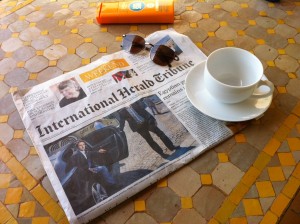One of the (many) pleasures of holidaying in France is having the time to read the International Herald Tribune from cover to cover every day. (I try to look at it most days when I’m back home, but generally wind up just scanning the front page and the Op-Ed pages inside. In France, we buy it every day and savour it over breakfast.)
Le Trib (as some newsagents call it here) is an exceedingly good journalistic product. It uses its front page essentially as a content-bill for almost everything inside — which means that ever front-page snippet ends with a forward reference. So this morning’s piece headlined “Airlines Are Spending Billions in an Arms Race for Leg Room” comes to a temporary halt with “SEATS, PAGE 10” (where I learn that Business Class aircraft seats can cost over $250,000 each to make and install).
Editorially, the Trib makes a pretty good stab at bridging the cultural chasm that yawns between Europe and the US. Its coverage of European countries (especially France and Germany), though necessarily selective, is pretty informative. It’s good on cultural stuff. Yesterday’s paper, for example, had a terrific review of the latest Bayreuth production of the Ring Cycle. Earlier in the week, there was a good double-page spread on the Salzburg Festival, which had just kicked off. And the mix is leavened by ‘quirky’ pieces of the kind that foreign stringers and correspondents love to write — about the madness surrounding the royal baby in the UK, for example, or the astonishing fact that the French are eating fewer baguettes than they used to. Sacre Bleu!
The paper’s coverage is clearly slanted towards areas of the world where the US has major foreign policy interests. So there’s lots about Egypt and the Middle-East generally. And, of course, about China and Russia. In that sense, the Trib is indeed the international edition of the New York Times. And most of the OpEd pieces (Friedman, Krugman, Brooks, Cohen, et. al.) are ones from the Times that I’ve already read online. But that doesn’t matter: sometimes re-reading them in print helps.
What strikes one most, though, is the artfulness of the mixture. In the pre-Internet age, one of the great tests of a traditional newspaper was whether it was a good, satisfying read. The Trib easily meets that criteria, and perusing it over a leisurely breakfast reminds one of what good newspapers used to provide. I read a lot of stuff online, and couldn’t live without the Web. But there are some publications like the New Yorker — and the Trib — where print, despite its limitations, is still best.

